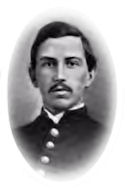 [September 19th]
[September 19th]
At eight o’clock the next morning, the 19th, the men on the skirmish line, suspecting by the stillness in front that something was up, advanced and found the enemy gone. Immediately the men stood up and all was excitement. The commanding general was notified and promptly ordered Porter’s corps in pursuit, while our corps set to work to succor the wounded and bury the dead. Advancing over the hill we found it covered with dead, mostly our men, but just below in the sunken road over which we originally charged, the rebel dead lay in regular ranks, so close together that it was hard to believe they were not living men in line of battle. Most of them had turned black with the two days’ exposure and it required more than a glance to convince ourselves they were not negro troops. A lot of the gallant Fifty-seventh fellows lay scattered about the hill, the ditch, and cornfield. Amongst them, conspicuous for his neatness and soldierly appearance, was Sergeant Risley, of Co. E, firmly grasping his musket, his features almost as natural as in life, and his appointments perfect in all respects. He was a fine fellow, much above the average in intelligence, and a splendid soldier, and like a soldier died, his face towards the foe. Several men were shot while climbing a rail fence near by, and some of them stuck fast, looking in one or two cases, from a distance, exactly like live men. There were men in every state of mutilation, sans arms, sans legs, heads, and intestines, and in greater number than on any field we have seen before. About noon Colonel Brooke directed me to bury the dead in front of our brigade, and with a strong fatigue party I immediately went to work. In one long grave we buried fifty-three U. S. soldiers gathered on this side of the sunken road, and in two others respectively, one hundred and seventy-three, and eighty-five rebel soldiers; we dug the ditches wide enough to hold two bodies, feet together, heads out, and long enough to hold all those the men had collected. When they were all carefully laid away, we threw over them some army blankets gathered on the field, and then replaced the earth. How many shattered hopes we buried there none of us may ever guess. War is certainly a dreadful thing, and a battlefield an ugly blot on civilization.
The country people flocked to the battlefield like vultures, their curiosity and inquisitiveness most astonishing; while my men were all at work many of them stood around, dazed and awe-stricken by the terrible evidence of the great fight; hundreds were scatered over the field, eagerly searching for souvenirs in the shape of cannon balls, guns, bayonets, swords, canteens, etc. They were all jubilant over the rebel defeat, of course, and claimed for us a mighty victory. I was much amused at the way they stared at me. Had I been the veritable Hector of Troy, I could have scarcely excited more curiosity than while in command of this burial party.
Our brigade moved down to the foot of the hill, immediately after it was known the enemy had decamped, and prepared hot coffee for the first time in three days. We took no immediate part in the pursuit of the rebels, that duty being taken by the cavalry and Porter’s corps.
In the course of the morning, I walked over to the hospital in rear of our lines, located in a house near by, and found General Richardson dangerously wounded, Lieutenant Bell of my regiment with his skull crushed, and Throop shot through the arm, which will probably necessitate its amputation. Bell was left on the battlefield all night, when some of his men discovered him still breathing. They carried him to the hospital, and he is still alive, with a remote possibility of pulling through. While our losses are heavy, they are said to be a mere bagatelle to those of the right wing. Twenty thousand men, it is claimed, were killed and wounded during the battle, which seems too enormous to be true.
General W. S. Hancock arrived on the field about 3 P. M. the evening of the fight, from Smith’s division, and assumed command of the division. He is a fine, soldierly looking officer, and distinguished himself, in a mild way, at the affair of Williamsburg. He brought two aides along with him, Lieutenants Mitchell and Parker. Mitchell is a tall, slim young fellow, who looks every inch a soldier. In this battle the Fifty-seventh and Third brigade came out with flying colors, every one admitting they behaved with exemplary gallantry, and achieved great success. In the charge, besides those killed and wounded, we captured several hundred of the enemy, rushing right over them and sending them to the rear. Two or three flags at least were captured, and so the regiment and brigade in a measure, were compensated for their heavy list of casualties. Our gallant Parisen fell in the cornfield at the head of his regiment. He was the kindest and bravest of men, and perhaps the best loved officer in the regiment. He was very good to me, and together we have spent many hours in search of recreation. He was very handsome, tall, straight and manly, and his death is a veritable loss to the service. Other Fifty-seventh officers killed are Folger of Company I, and Higbee of Company H, Throop, Britt, Jones, and Bell are wounded. The whole loss of the regiment is something over a hundred, which is wonderful, considering the fire they were exposed to.


